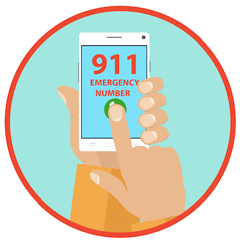SAFETY PLANNING
BE SAFE, PLAN AHEAD
Need our help now?
please call our 24-hour Helpline at 973-875-1211
(collect calls accepted)
- Safety Planning for Victims of Domestic Violence
> click here - Sexual Assault Safety Planning Risk Reduction
> click here
For Victims of Domestic Violence
Victims of domestic violence may face numerous risks on a daily basis, but planning ahead can enhance safety during or after a violent incident. Please contact DASI for an appointment, or call the 24-hour Helpline for assistance in developing a personalized safety plan for you and your family.
This brief outline may help you get started:
- Plan and practice how to get safely out of the house, and think about where you will go. Make sure your children understand this as well.
- Keep wallet, purse, keys, cash, medications, and important papers and phone numbers in an accessible place so that you can grab them if you need to leave quickly.
- Tell trusted neighbors about the violence and ask that they call the police if they hear suspicious noises. Set up a code word or signal with them if necessary.
 Teach children to call 911.
Teach children to call 911.- During an argument, remain in rooms with access to an outside door if possible.
- Obtain prepaid phones/cards or use a friend’s phone to keep communications confidential.
- Be aware of the many ways abuse can occur through the use of technology.
Safety planning with a restraining order, or when your partner has left the home:
- Always keep your restraining order on or near your person. Remember it when you change handbags.
- Give copies of the restraining order to police departments in the community where you live and visit or work on a regular basis. Give copies to your children’s schools.
- Inform trusted friends, clergy, and your employer that you have a restraining order in effect.
- You may call the police if your partner violates the restraining order.
- Prepare a safety plan, or alter your usual routine when leaving work, or when grocery shopping, banking, etc.
- Change the locks and/or install a security system. Increase outdoor lighting.
- Ask neighbors to call the police if they see your partner near your house.
- Remember, there are many ways that social media can disclose your location.
Safety and your emotional health:
- Have a plan for when you feel depressed and alone and tempted to return to a potentially abusive situation.
- Have a plan for when you must communicate with your partner in person or by phone.
- Read and learn about the dynamics of domestic violence and abuse in relationships.
- Enlist the support of trusted family and friends.
- Reach out for services designed to help, such as counseling and support groups at your local domestic violence program.
Sexual Assault Safety Planning & Risk Reduction
It is often the case that an act of sexual violence will surprise the victim. The offender may be someone known to the victim or a stranger. The following guidelines are helpful for keeping an individual safe from someone who is intent on doing harm.
Be Prepared
Common sense things we sometimes forget:
- Stay in groups, there is safety in numbers.
- Plan your outings and let friends and loved ones know your plans.
- Reduce alcohol consumption. Studies indicate that the most common date rape drug is alcohol.
- Never leave a drink unattended. Educate yourself about date rape drugs.
- Walk only in well-lit areas.
- Keep the doors to homes and cars locked.
- Know where a phone is located.
- Don’t go anywhere alone with someone unless you know the person very well and trust him or her.

Be Alert
You should be especially alert if the person you are with:
- Ignores, interrupts, or makes fun of you
- Sits or stands too close to you or stares at you
- Has a reputation for being a “player”
- Drinks too much or uses drugs; tries to get you to use drugs or alcohol
- Tries to touch or kiss you or gets into your “personal space” when you barely know him or her
- Wants to be alone with you before getting to know you, or pressures you to be alone together
- Does what he or she wants without asking what you want
- Gets angry or sulks if he or she doesn’t get what he or she wants
- Pressures you to have sex, or tries to make you feel guilty for saying “no.”

Trust your instincts;
if a place or person feels unsafe, it probably is.
- Watch for signs of trouble such as strangers in private areas or persons loitering in places where they shouldn’t be.
- If you sense trouble, get to a safe place as soon as possible.
- If you feel you are in danger, attract help any way you can.
Be Assertive
Act confidently and assured. Offenders target vulnerable individuals.
- Being assertive means that you state what you want.
- Remember: “No” means “No.” If you do not want to be intimate with another person, tell him or her clearly. Use a confident voice and body posture.
- Match your body language to your words – don’t laugh and smile while saying “No.”
- Do not just “go along” for the wrong reasons.
Safety Planning After a Sexual Assault
Following a sexual assault the victim may feel unsafe. Call the DASI HELPLINE, 973-875-1211, when you feel unsafe or need to safety plan.
Safety in Your Own Residence
- You can change the locks on my doors and windows as soon as possible.
- You can install security systems including additional locks, window bars, poles to wedge against doors, an electronic system, etc.
- You can install lighting system that lights up when a person is coming close to my house.
 You can notify friends and family of your safety concerns.
You can notify friends and family of your safety concerns.- You can keep the doors and windows locked.
- You can preprogram home and cell phone for 9-1-1
Be Alert
- As soon as you get in your car lock your car doors.
- Trust your instincts; if a place or person feels unsafe, it probably is.
- Watch for signs of trouble such as strangers in private areas or persons loitering in places where they shouldn’t be.
- If you sense trouble, get to a safe place as soon as possible.
- If you feel you are in danger, attract help any way you can.
- Seek safe shelter at DASI
Protective Orders
In New Jersey, a groundbreaking law has gone into effect as of May 2016. The Sexual Assault Survivor Protection Act (SASPA), allows for victims of nonconsensual sexual assault to file for a protective order against the person that assaulted them.
- Nonconsensual sexual assault is defined as nonconsensual sexual contact, sexual penetration, or lewdness, or any attempt at such conduct.
- A protection order may be applied for even if there are no criminal charges filed against the person who assaulted them.
- If the victim is under 18 years old or has a developmental disability, the parents or guardian of that victim may file for the order, allowing for a large range of victims to request for protective orders.
Similar to a regular restraining order that can be filed in a domestic violence incident, a victim through SASPA first obtains a Temporary Protective Order and then applies for a Final Protective Order, which is filed in the Superior Court.
The following are factors a judge must find for a final protective order:
1) one or more acts of nonconsensual sexual contact, sexual penetration, lewdness, or any attempt at such conduct at the alleged victim
2) the possibility of future risk of the safety or well-being of the alleged victim
This order can provide immediate relief to a survivor of sexual assault and prohibits the pursuant from any and all forms of contact and communication with the sufferer. If the accused is found to be guilty of nonconsensual sexual assault then a Final Protective Order can be issued. A final protective order will protect a victim’s well being from the possibility of danger from the same assailant and the possibility of future risk of any contact, communication, stalking, and harassment, including cyber-bullying.





